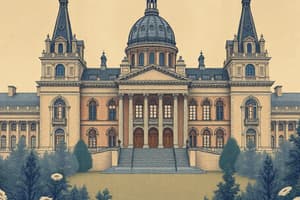Podcast
Questions and Answers
What are the key differences between democracy and authoritarianism?
What are the key differences between democracy and authoritarianism?
Democracy emphasizes individual freedoms and participation in governance, while authoritarianism centralizes power in a single authority with limited political freedoms.
Name three major political ideologies and briefly describe one.
Name three major political ideologies and briefly describe one.
Three major political ideologies are liberalism, conservatism, and socialism. Liberalism emphasizes individual freedoms and equal rights for all citizens.
What are the main functions of political parties?
What are the main functions of political parties?
Political parties represent diverse interests, facilitate governance, and structure political debate within a political system.
Describe the role of the executive branch in government.
Describe the role of the executive branch in government.
What is the significance of civic engagement in a democracy?
What is the significance of civic engagement in a democracy?
Flashcards are hidden until you start studying
Study Notes
Definition
- Pertaining to the governance, policies, or activities of a state or community.
Key Concepts
-
Political Systems
- Types: Democracy, Authoritarianism, Monarchy, Totalitarianism.
- Structures: Federal, Unitary, Confederal.
-
Political Ideologies
- Liberalism: Emphasizes individual freedoms and equal rights.
- Conservatism: Values tradition, social stability, and maintaining established institutions.
- Socialism: Advocates for social ownership and egalitarian distribution of resources.
- Fascism: Authoritarian, nationalistic, and often involves a dictatorial power.
-
Political Parties
- Functions: Represent diverse interests, facilitate governance, and structure political debate.
- Major types: Major parties, Minor parties, Independent candidates.
-
Elections and Voting
- Processes: Primaries, General elections, Midterm elections.
- Systems: First-past-the-post, Ranked choice, Proportional representation.
-
Government Branches
- Executive: Responsible for enforcing laws (President, Prime Minister).
- Legislative: Makes laws (Parliament, Congress).
- Judicial: Interprets laws (Supreme Court, Lower courts).
-
International Relations
- Diplomacy: Negotiation and communication between states.
- Treaties: Formal agreements between countries.
- Organizations: United Nations, NATO, EU.
-
Political Theory
- Key thinkers: Plato, Machiavelli, John Locke, Karl Marx, John Stuart Mill.
- Concepts: Justice, Power, Sovereignty, State authority.
Political Participation
- Methods: Voting, Advocacy, Campaigning, Interest groups.
- Importance of civic engagement for democracy.
Current Trends
- Rise of populism and nationalism.
- Impact of social media on political communication.
- Global issues: Climate change, migration, economic inequality.
Political Systems
- Governments operate under various systems, each with different structures and power dynamics.
- Democracy: Citizens hold power through elections, with majority rule and protection of individual rights.
- Authoritarianism: Power concentrated in a single ruler or a small group, with limited citizen participation.
- Monarchy: Rule by a hereditary sovereign, with varying degrees of power and influence.
- Totalitarianism: Complete control over all aspects of life, including politics, economy, and society.
- Federal systems divide power between a central government and regional units.
- Unitary systems centralize power in a national government.
- Confederal systems grant significant power to regional units, with a weak central government.
Political Ideologies
- Different ideologies underpin political systems, shaping values and beliefs.
- Liberalism: Emphasizes individual liberty, limited government intervention, and equality before the law.
- Conservatism: Prioritizes tradition, social stability, and maintaining established institutions.
- Socialism: Advocates for social ownership of production and distribution, aiming for economic equality.
- Fascism: Authoritarian, nationalistic ideology that emphasizes a strong, centralized state and often involves a dictatorial leader.
Political Parties
- Political parties play a crucial role in democratic societies.
- Major parties: Dominant forces with broad appeal and established platforms.
- Minor parties: Focus on specific issues or ideologies, often serving as alternative voices.
- Independent candidates: Contest elections without affiliation to a party.
Elections and Voting
- Elections are the cornerstone of democratic governance, allowing citizens to choose their leaders.
- Primaries: Pre-election processes where political parties select their candidates.
- General elections: Contests between candidates from different parties or independent candidates.
- Midterm elections: Occur at the midpoint of a presidential term, usually for legislative seats.
- First-past-the-post: System where the candidate with the most votes wins, regardless of the percentage.
- Ranked choice: Allows voters to rank candidates in order of preference, enabling a winner with majority support.
- Proportional representation: Allocates seats in proportion to the percentage of votes received by parties.
Government Branches
- Separation of powers ensures balance among different branches of government.
- Executive branch: Enforces laws through the president or prime minister.
- Legislative branch: Makes laws through a parliament, congress, or assembly.
- Judicial branch: Interprets laws and ensures their constitutionality through courts.
International Relations
- States interact through diplomacy, treaties, and international organizations.
- Diplomacy: The art of conducting relations between states through negotiations, communication, and agreements.
- Treaties: Formal agreements between countries, covering topics such as trade, security, or human rights.
- International organizations: Collectives of states working together on global issues, such as the United Nations, NATO, and the European Union.
Political Theory
- Political theory examines fundamental concepts and principles of politics.
- Key thinkers: Plato, Machiavelli, John Locke, Karl Marx, and John Stuart Mill contributed significantly to political thought.
- Concepts: Justice, power, sovereignty, and state authority are central to political theory.
Political Participation
- Individuals engage in the political process through various methods.
- Voting: The most common form of participation, allowing citizens to choose leaders and policies.
- Advocacy: Actively promoting specific causes, ideas, or interests.
- Campaigning: Supporting candidates or initiatives through direct action or fundraising.
- Interest groups: Organizations that represent specific interests and lobby for their goals.
Current Trends
- Populism and nationalism are on the rise, often fueled by dissatisfaction with established politics.
- Social media has transformed political communication, creating new opportunities for citizen engagement and mobilization.
- Climate change, migration, and economic inequality are significant global issues, impacting political agendas and international relations.
Studying That Suits You
Use AI to generate personalized quizzes and flashcards to suit your learning preferences.




